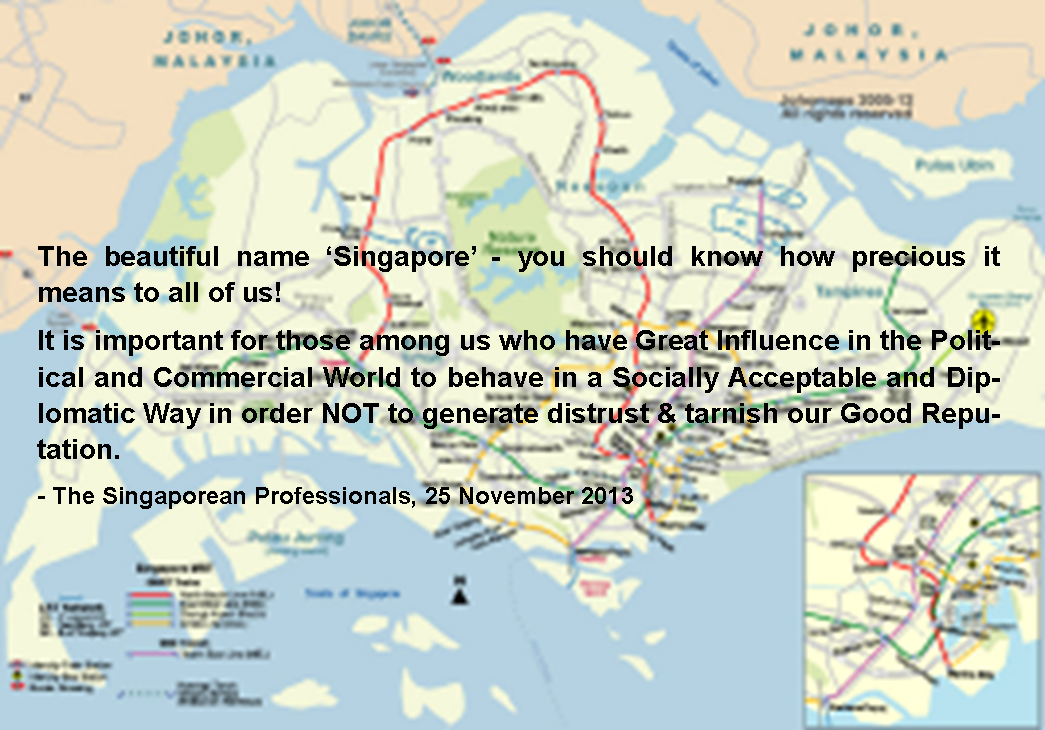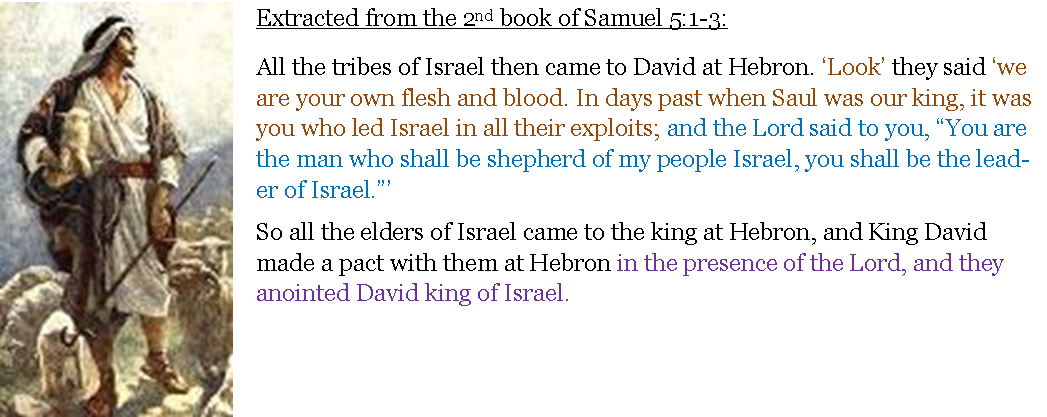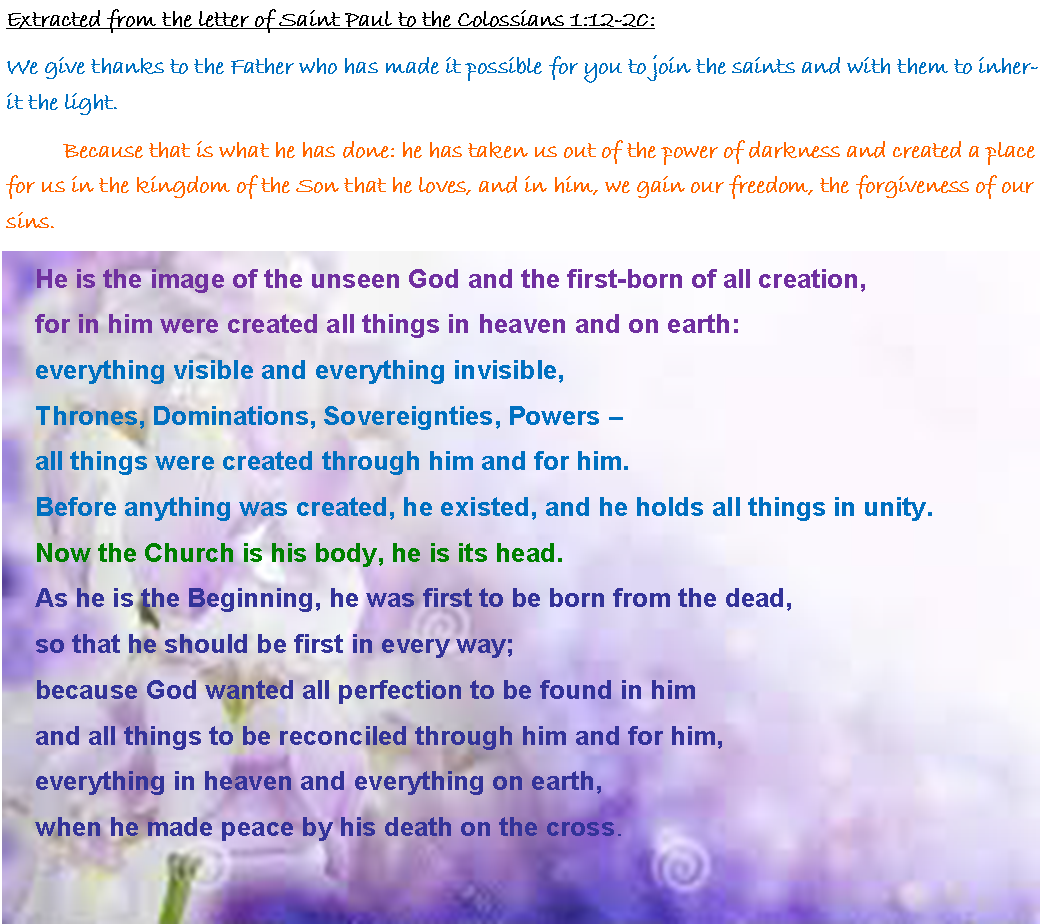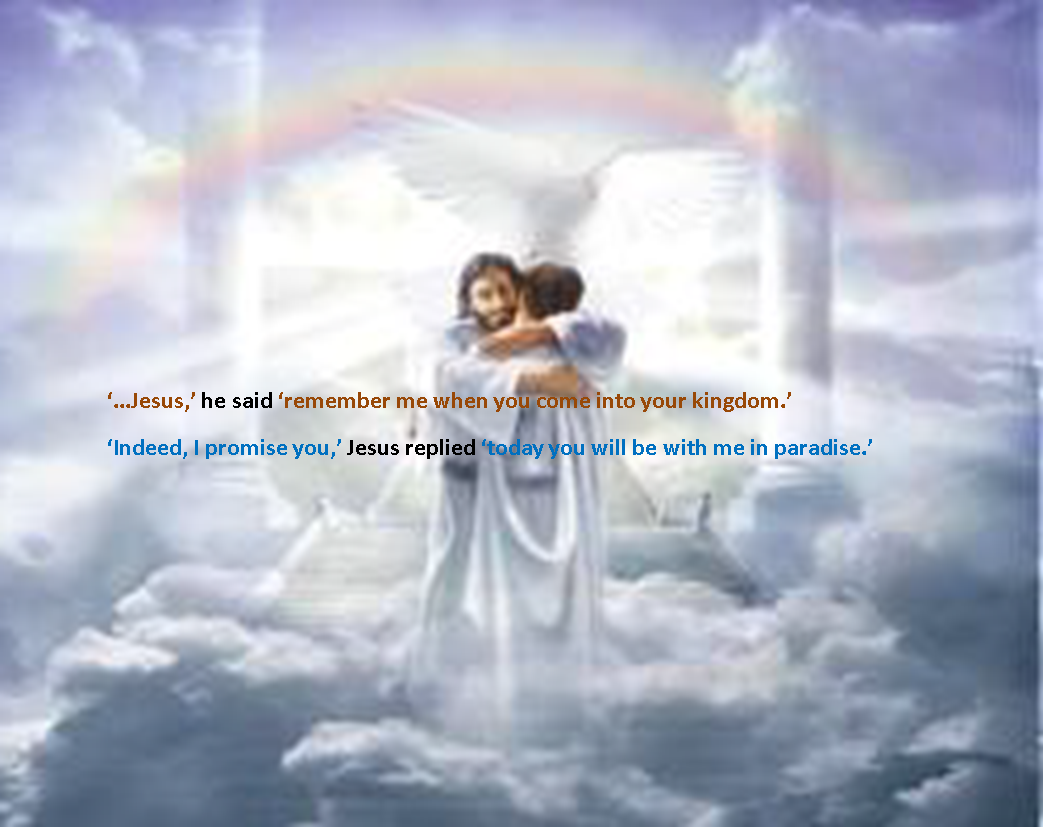|
86 |


|
Extracted from Psalm 122:1-5: I rejoiced when I heard them say: ‘Let us go to God’s house.’
I rejoiced when I heard them say: ‘Let us go to God’s house.’ And now our feet are standing within your gates, O Jerusalem.
Jerusalem is built as a city strongly compact. It is there that the tribes go up, the tribes of the Lord.
For Israel’s law it is, there to praise the Lord’s name. There were set the thrones of judgement of the house of David. |


|
Extracted from the holy Gospel according to Luke 23:35-43: The people stayed there before the cross watching Jesus. As for the leaders, they jeered at him. ‘He saved others,’ they said ‘let him save himself if he is the Christ of God, the Chosen One.’ The soldiers mocked him too, and when they approached to offer vinegar they said, ‘If you are the king of the Jews, save yourself.’ Above him there was an inscription: ‘This is the King of the Jews.’ One of the criminals hanging there abused him. ‘Are you not the Christ?’ he said. ‘Save yourself and us as well.’ But the other spoke up and rebuked him. ‘Have you no fear of God at all?’ he said. ‘You got the same sentence as he did, but in our case we deserved it: we are paying for what we did. But this man has done nothing wrong. Jesus,’ he said ‘remember me when you come into your kingdom.’ ‘Indeed, I promise you,’ he replied ‘today you will be with me in paradise.’ Sharing:
It was the Solemnity of “Our Lord Jesus Christ, Universal King” on 24 November 2013.
Here are the Readings that were read in the Eucharistic Celebrations all over the world on the same day (see above): 1st Reading: 2 Samuel 5:1-3, Responsorial: Psalm 122:1-5, 2nd Reading: Colossians 1:12-20 & Gospel Reading: Luke 23:35-43.
We have extracted the Homilies of Blessed Pope John Paul II, Pope Benedict XVI & Pope Francis I based on the aforesaid Readings to share with you, so that you could similarly be encouraged: |

|
SPECIAL ASSEMBLY FOR OCEANIA OF THE SYNOD OF BISHOPS EUCHARISTIC CONCELEBRATION HOMILY OF HIS HOLINESS JOHN PAUL II Solemnity of Our Lord Jesus Christ, King of the Universe
1. “Jesus of Nazareth, the King of the Jews”. This is the title put on the cross. Shortly before Christ’s death, one of the two condemned men crucified with him said to him: “Jesus, remember me when you come into your kingdom”. What kingdom? The object of his request was certainly not an earthly kingdom but another one.
The good thief speaks as if he had heard the words exchanged earlier between Pilate and Christ. Indeed, it was before Pilate that Jesus had been accused of wanting to make himself king. Pilate had questioned him about this: “Are you the King of the Jews” (John 18:33). Christ had not denied it; he had explained: “My kingship is not of this world; if my kingship were of this world, my servants would fight, that I might not be handed over to the Jews; but my kingship is not from the world” (John 18:36). Jesus had replied directly to Pilate’s repeated question as to whether he were a king: “You say that I am a king. For this I was born, and for this I have come into the world, to bear witness to the truth. Everyone who is of the truth hears my voice” (John 18:37).
2. Today’s Liturgy speaks of the earthly kingdom of Israel by recalling the anointing of David as King. Yes, God had chosen Israel; he sent it not only prophets but even kings, when the Chosen People insisted on having an earthly ruler. Of all the kings who sat upon the throne of Israel, the greatest was David. When the first reading of this celebration speaks of that kingdom, it does so to recall that Jesus of Nazareth was of the line of King David, but also, and above all, to emphasize that the royalty proper to Christ is of a different kind.
The words which Mary heard at the Annunciation are significant: “The Lord God will give to him the throne of his father David, and he will reign over the house of Jacob for ever; and of his kingdom there will be no end” (Luke 1:32-33). This kingdom, then, is not only the earthly kingdom of David, which came to an end. It is the Kingdom of Christ, which will never end, the eternal Kingdom, the Kingdom of truth, of love and of eternal life.
The Good Thief crucified with Jesus came in some way to the heart of this truth. Indeed, in a certain sense he became a prophet of this eternal Kingdom when, hanging on the cross, he said: “Jesus, remember me when you come into your kingdom” (Luke 23:42). Christ said in reply: “Today you will be with me in Paradise” (Luke 23:43).
3. To this Kingdom, which is not of this world, Jesus invited us to look when he taught us to pray: “Thy Kingdom come”. Obedient to his command, the Apostles, the disciples and the missionaries of all times have done their best to extend, through evangelization, the boundaries of this Kingdom. For it is both the gift of the Father (cf. Luke 12:32) and the result of man’s personal response. In the “new creation”, we will be able to enter into the Kingdom of the Father only if we have followed the Lord during our earthly pilgrimage (cf. Matthew 19:28).
This, then, is the programme of every Christian: to follow the Lord, the Way, and the Truth, and the Life, in order to possess the Kingdom which he has promised and given. Today, in this solemn Eucharistic concelebration, we are inaugurating the Special Assembly for Oceania of the Synod of Bishops, which has as its theme: “Jesus Christ and the Peoples of Oceania: Walking his Way, Telling his Truth and Living his Life”.
Welcome, venerable and dear Brothers in the Episcopate, who have the pastoral care of the particular Churches of the Continent of Oceania. Together with you I greet all those who will take part in the work of the Synod and all who have been active in its preparation. I would also like to extend a cordial greeting to the Christian communities and the peoples of Oceania who are spiritually united with us at this moment.
“Jesus, the Incarnate Word, was sent by the Father to the world to bring it salvation, to proclaim and establish the Kingdom of God... The Father, in raising him from the dead, made him, perfectly and for ever, the Way, and the Truth, and the Life, for all who believe” (Instrumentum Laboris, 5). That farflung portion of the Church, which extends over the immense spaces of Oceania, knows the Way and it knows that there it will find the Truth and the Life: the way of the Gospel, the way pointed out by the Saints and the Martyrs who gave their lives for the Gospel (cf. Instrumentum Laboris, 4).
4. As the universal Church prepares to cross the threshold of the third Christian millennium, the Pastors of Oceania are gathered in communion, united with the Successor of Peter, to give new energy to the pastoral concern which spurs them to proclaim the kingship of Christ in the diversity of cultures and human, social and religious traditions, and in the remarkable variety of their peoples.
In the second reading the Apostle Paul explains the nature of the kingdom of which Jesus speaks. He writes to the Colossians: we must give thanks to God who “has delivered us from the dominion of darkness and transferred us to the kingdom of his beloved Son, in whom we have redemption, the forgiveness of sins” (1:13-14). It is precisely this forgiveness of sins which the good thief inherited on Calvary. He was the first to experience the fact that Christ is King, because he is the Redeemer.
The Apostle then explains what Christ’s kingship is: “He is the image of the invisible God, the first-born of all creation; for in him all things were created, in heaven and on earth, visible and invisible, whether thrones or dominions or principalities or authorities — all things were created through him and for him. He is before all things, and in him all things hold together” (Colossians 1:15-17). Thus Christ is King above all as the first-born of all creation.
The Pauline text continues: “He is the head of the body, the Church; he is the beginning, the first-born from the dead, that in everything he might be pre-eminent. For in him all the fullness of God was pleased to dwell, and through him to reconcile to himself all things, whether on earth or in heaven, making peace by the blood of his cross” (ibid., 1:18-20). With these words the Apostle again confirms and justifies what he had revealed about the essence of Christ’s kingship: Christ is King as the first-born of the dead. In other words, as Redeemer of the world, the risen and crucified Christ is King of the new humanity.
Continue next page …
1 December 2013 |